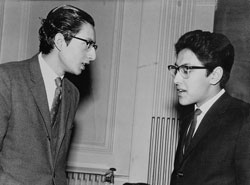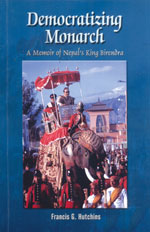 |
| YES, YOUR MAJESTY: King Birendra (right) while he was studying in Eton in 1964 with Chiran S Thapa, who would later be his secretary and adviser. |
For Francis G Hutchins, author of Democratizing Monarch - A Memoir of King Birendra, his pupil at Harvard during the academic year 1967-68 could do no wrong.
The late king, then crown prince, was a good student "always affable, polite and attentive, deferential toward his parents, wore jeans like other students at Harvard at the time, and retained his remarkable modesty even after he returned to Nepal and became officially...both an emperor and a god, albeit of a benign and approachable sort." Small wonder that the late king became "part of (the author's)... life."
King Birendra was a cut above lesser mortals but, whether Aristotle would have been as uncritical of Alexander had Aristotle outlived his pupil of another time and place, will remain one of history's mysteries. The Aristotle-Alexander reference is derived from Hutchins' fascination with that tutor-king relationship.
Professor Hutchins has delved deep into Nepal's history and assisted by Fr Ludwig Stiller's seminal works has used state-of-the art analytical tools developed and used at Harvard's Department of Government to assess King Birendra's three-decade reign. He places King Birendra as a successor to Kings Tribhuban and Mahendra, and above all to Prithbi Narayan Shah, comparing Nepal's unifier to George Washington.
To Hutchins, the problems faced by Prithbi Narayan Shah, who succeeded in founding "a dynamic pre-modern empire more socially progressive than any seen before" became even more complicated and difficult during the five-decade restoration of Shah rule 1951-2001.
With "Mao's China having swallowed Tibet in 1959" and relations with India having "necessitated greater vigilance," even greater than toward China to "forestall cultural if not political absorption."
In such an adverse geopolitical environment, one would have thought that the right strategy would have been to examine alternatives to forestall hostile military action. King Birendra chose to have one kind of relationship with India, based on the shared practices of Hinduism and India as the transit country for international trade and a strategic relationship. With China, it was the Himalayas as the boundary and the Tibetan culture and way of life common to the peoples on either side of the mountains.
In other words, he chose to go it alone, but it could well have been that with a better appreciation of the postwar role of the United States he could have looked to a partnership which could have guaranteed the preservation of Nepal's sovereignty.
The author is critical of US actions in general and of China's policies and Indian behaviour toward Nepal specifically. In sharp contrast, his analysis is one of high appreciation of the efforts of King Birendra and his ancestors in preserving Nepal as a country where no foreign flag has been allowed to fly while continuing with a tradition of constitutional monarchy as formulated in Dibya Upadesh to King Birendra's re-introduction of parliamentary democracy in the early 1990s.
The book is not without lighter moments. The author's bizarre three-way exchanges with Lord Casey (one time governor of Bengal) and Lowell Thomas (the pioneering tv explorer) during King Birendra's wedding celebrations in 1970 and the description of Imelda Marcos and Lord Mountbatten ('failure as the last viceroy of India').
Hutchins attended both the wedding and King Birendra's coronation as guest of his pupil-King. The author's knowledge of Sanskrit seen in the translation of the epic Hitopadesh provide depth and relevance to the book.
His erudition is manifest in pithy but eye-opening analyses of much of contemporary significance in South Asia, such as his view on the appropriate solution of the Kashmir problem.
Unfortunately, in peddling a rehash of conspiratorial bajar gossip of the palace massacre of 1 June 2001, the author inserts a discordant note to the otherwise even tenor of the major part of his work. He would have risen to the book's general lofty level had he, for example, put the massacre in the perspective of the assassinations of three Gandhis (the Mahatma, Indira and Rajiv) which surely is within his area of research competence. But his object of love is "the last great Shah ruler, Birendra, a pivotal figure in the history of Nepal always a deeply constitutional ruler".
Chiran S Thapa was adviser and secretary to King Birendra and is currently a freelance writer and commentator on political and economic issues.

Democratizing Monarch -
A Memoir of King Birendra
Vajra Books 2007
pages 138
price Rs 350
Available at Vajra Book Shop,
Thamel and at Mandala, Kantipath.


